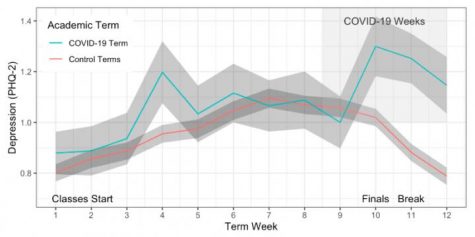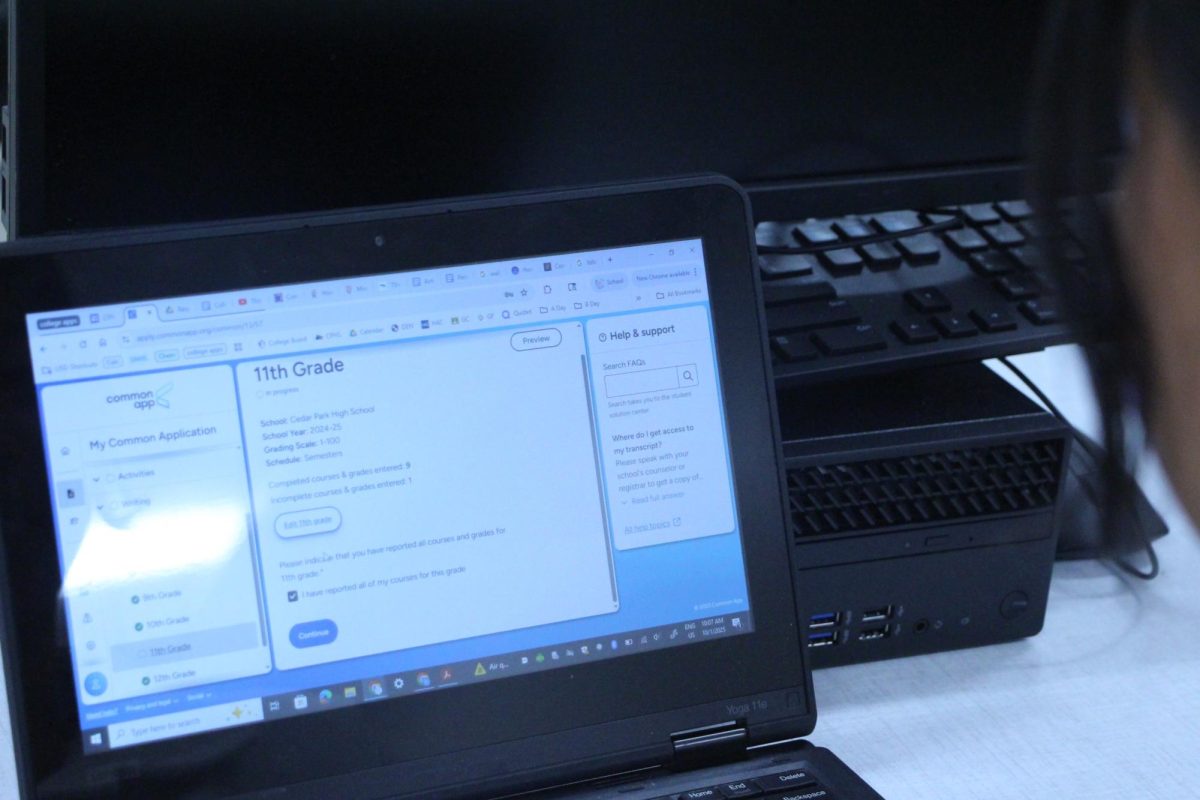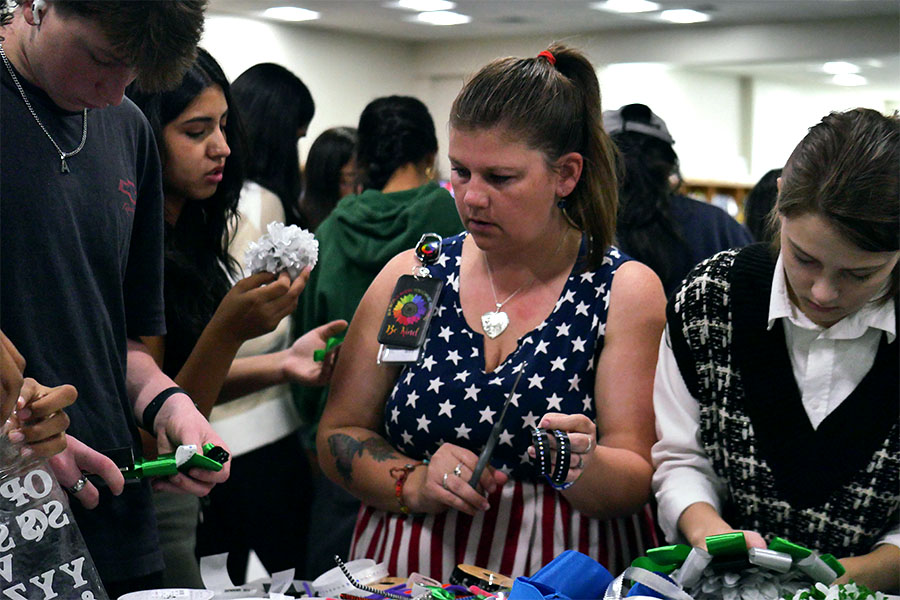Self-Health Check
Students Face Mental Health Issues Admist Pandemic
Photo by Joshua Rawson-Harris on Unsplash.
During the course of quarantine and online schooling, there have been reports of increased levels of stress and anxiety for students. This anxiety can develop into depression and other health issues. Addressing these feelings is highly recommended
Beginning with an extension to spring break last March and having to remain in quarantine, students have also had to deal with the issues of the outside world. During quarantine, people couldn’t come into contact with anyone else or see much of anything except the walls of their homes. As a result, mental and emotional health was at risk.
Medical News Today, a website that reports on the latest advancements in medicine and health research, cites a study in the journal “American Psychologist,” saying that out of 842 respondents in the study, “almost 25% of the respondents significantly worse anxiety and depression during lockdown.” The website goes on to say that “37.5% of the respondents met clinical metrics for generalized anxiety, depression, or health anxiety during the survey period,” in which 15% of the respondents were clinically recognized with health anxiety (otherwise known as Hypochondria), or the fear of “developing a serious disease, despite reassurances from medical professional.”
High school students, specifically, “are facing challenges that have never happened before on this scale,” according to Child and Adolescent, a non-profit that focuses on child and adolescent behavioral health.
According to Best Colleges, an organization that provides information about education, as well as conducts research regarding students and education, 78% of homes that have a high school student reported having disruptions due to COVID-19. Furthermore, the educational disruption, being the transfer to online classes, haven’t made their situation much easier. 71% of households with high school students have reported “increased stress from this disruption”

In order to mitigate the mental effects of COVID-19, students need to identify the symptoms they are facing. The Childmind Institute, a nonprofit that focuses on the mental health of children, said some symptoms include:
General “down” feeling: During quarantine and online school, feeling down is a common symptom. Being stuck in front of a screen and a limited amount of social interactions can generate a dull feeling. According to the ChildMind Institute, this symptom is problematic if it persists even when “circumstances change.”
Loss of interest: Another prominent sign of mental stress. According to HealthDirect, an Australian organization that provides digital health services, “this can leave you feeling isolated, which can also make you prone to anxiety.”
Change in sleeping patterns: According to Sleep Foundation, an organization that focuses on the science of sleep and overall health, “the relationship between sleep and depressive illness is complex – depression may cause sleep problems and sleep problems may cause or contribute to depressive disorders.”
Harsh self-assessment: According to Psychology Today, there are three types of self: actual, ideal, and ought. In a study they said, “if there is a mismatch between your actual and ideal selves, then you are more likely to get depressed.”
Self-care is more important than ever during these times. It is vital that people look after themselves physically and mentally. It is also very easy to lose sight of what is going on, not just with yourself, but with others and the environment. As a result, knowing the ways to take care of ourselves is important. This way we can prevent any signs of mental stress.
Some of the ways to keep yourself mentally healthy include:
Taking breaks from social media, television, etc: This is vital to your emotional health, as reports about the COVID-19 and world affairs are everywhere and upsetting according to the CDC. According to AmericanBehavioralClinics(ABC), an organization that provides help for mental illness, the benefits of taking a social media break are:
Inner peace: ABC said that by taking media breaks and going outside or experiencing other things, “we can reconnect with ourselves, be in the here and now, and get further in touch with nature to re-establish our inner calm and sense of well-being.”
Time to reconnect: According to The Healthy, a website that gives health advice, “cutting ties with the internet can work wonders for your tangible friendships.” The website also deems personal relationships to be stronger than the virtual ones and recommends taking time off social media to strengthen these bonds. Social media also increases communications, but, according to Social Work Today, a magazine that focuses on social issues, we are not strengthening our personal relationships, but our virtual relationships.
Better sleep: Generally, prolonged usage of media and technology decreases the production of melatonin, a hormone that induces sleep. ABC said that if you are feeling “negative, angry, anxious, or agitated, this can affect your ability to fall asleep” and have a overall have a “bad effect on your energy levels.”
Take care of your body: Eating well, sleeping well, exercising, etc. can help you keep a calm and healthy mind. According to WebMD, a website that provides health information, exercising releases endorphins, a hormone that “[triggers] positive feelings in the body”. These ultimately lead to a happier mind as well. WebMD also says that regular exercise has been proven to reduce stress and anxiety, improve sleep, and boost self-esteem.
Manage emotional health: The CDC also recommends tending to your emotional health so that you will be able to “think clearly and react to the urgent needs to protect yourself and your family.” A great way to do this is meditation. PsychologyToday says that meditation can boost your immune system, relieve anxiety and help improve emotional health. Other ways to boost emotional health include doing things you love and deep breathing. MISSING LINKS
Talk and be open about your feelings: This is perhaps the biggest component of maintaining a healthy mind. The New York Times cites research done by UCLA in which study results showed that “putting feelings into words-a process called ‘affect labeling’-can diminish the response of the amygdala when you encounter things that are upsetting. This is how, over time, you can become less stressed over something that bothers you.”
If you or someone you know needs additional help or advice in mental health please visit the CPHS Counseling website for resources.

Ruchi Sankolli is a senior, this is her third year on staff, and her first year as the Assistant Editor of the Wolfpack. She mainly enjoys writing opinion pieces about current events. In addition to the Wolfpack, she is also involved in the 4-H Youth Toastmasters Gavel Club, HOSA and NHS. She enjoys listening to music, watching anime, reading horror novels, writng stories, and playing with her dog. She plans on attending either UT Austin or Texas A&M to major in the healthcare field.







![As her hair blows in the wind, senior Brianna Grandow runs the varsity girls 5K at the cross country district meet last Thursday. Grandow finished fourth in the event and led the varsity girls to regionals with a third place placement as a team. “I’m very excited [to go to regionals],” Grandow said. “I’m excited to race in Corpus Christi, and we get to go to the beach, so that’s really awesome.” Photo by Addison Bruce](https://cphswolfpack.com/wp-content/uploads/2025/10/brianna.jpg)


![Broadcast, yearbook and newspaper combined for 66 Interscholastic League Press Conference awards this year. Yearbook won 43, newspaper won 14 and broadcast took home nine. “I think [the ILPC awards] are a great way to give the kids some acknowledgement for all of their hard work,” newspaper and yearbook adviser Paige Hert said. “They typically spend the year covering everyone else’s big moments, so it’s really cool for them to be celebrated so many times and in so many different ways.”](https://cphswolfpack.com/wp-content/uploads/2025/05/edited-ILPC.jpg)





![Sitting with her friend senior Sohpia Struve at last year’s Austin City Limits Festival, senior Ava Zuniga poses for a picture under a pavilion. They are frequent attendees at ACL, an annual music festival at Zilker Park. “I would recommend seeing a bunch of people,” Zuniga said. “This past year, we camped out for Chappell [Roan] for a really long time. I think the whole point of ACL, [which] is a lot of fun, is that you can go see so many different people, even if you don’t know them. So by camping by one person, it really limits yourself from being able to go see a bunch of people.” Photo courtesy of Ava Zuniga](https://cphswolfpack.com/wp-content/uploads/2025/10/EE9E9484-FE6F-4AA0-B5F5-0C177AB32841-1200x857.jpeg)
![Looking down at his racket, junior Hasun Nguyen hits the green tennis ball. Hasun has played tennis since he was 9 years old, and he is on the varsity team. "I feel like it’s not really appreciated in America as much, but [tennis] is a really competitive and mentally challenging sport,” Nguyen said. “I’m really level-headed and can keep my cool during a match, and that helps me play a bit better under pressure.” Photo by Kyra Cox](https://cphswolfpack.com/wp-content/uploads/2025/09/hasun.jpg)

![Bringing her arm over her head and taking a quick breath, junior Lauren Lucas swims the final laps of the 500 freestyle at the regionals swimming competition on date. Lucas broke the school’s 18-year-old record for the 500 freestyle at regionals and again at state with a time of 4:58.63. “I’d had my eye on that 500 record since my freshman year, so I was really excited to see if I could get it at regionals or districts,” Lucas said. “ State is always a really fun experience and medaling for the first time was really great. It was a very very tight race, [so] I was a bit surprised [that I medaled]. [There were] a lot of fast girls at the meet in general, [and] it was like a dogfight back and forth, back and forth.” Photo by Kaydence Wilkinson](https://cphswolfpack.com/wp-content/uploads/2025/03/Kaydence-2.7-23-edit-2.jpg)
![As the support team sits and poses for a photo in the cafeteria with the counseling team they eagerly wait to start their day. "We [all] seem to be a team, I get up every day and there's days where I don't want to go to work today, but I'm thankful that I have a job and I'm blessed to have what I have," Christopherson said. Photo Courtesy of Julie Weltens.](https://cphswolfpack.com/wp-content/uploads/2025/01/AF9E8470-10D7-4C91-BF28-EC8F86BAB66C-1200x852.jpeg)
![Jumping off the ground, senior linebacker Bennett Patton snatches the ball out of the air for an interception at Thursday’s game against Chaparral. Patton had two interceptions in the 56-14 victory, tying the school record for interceptions in a game. “I was just playing the game,” Patton said. “[I’m] going to go into next week, forget about it and stay humble.” Photo by Harper Chapman](https://cphswolfpack.com/wp-content/uploads/2025/09/bennett-interception.jpg)














